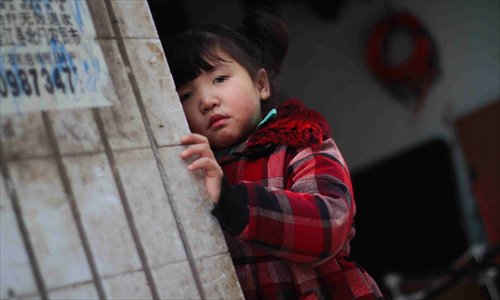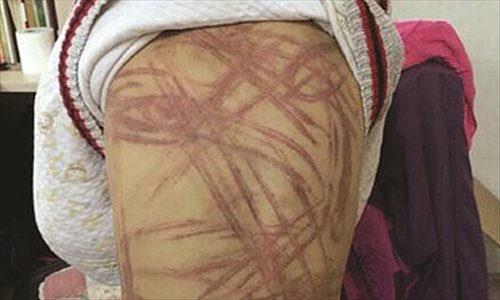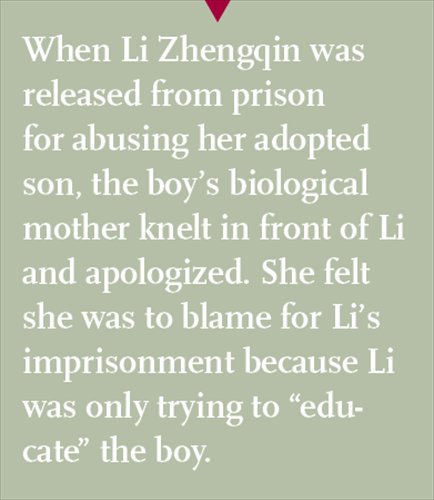High-profile cases of child abuse are just the tip of the iceberg: expert
From time to time, extreme child abuse cases are exposed which challenge commonly held attitudes toward discipline. It is sad to read such news stories, but even sadder, they are just a tip of the iceberg. In China, where it is still common to beat children to "educate" them, too many cases of child abuse have gone unnoticed just because they are not so extreme.

A girl tries to hide behind a wall. Photo: CFP
Around this year's Tomb-Sweeping Day, an April national holiday in which people show respect to their ancestors, an 11-year-old girl named Wenwen (pseudonym) was killed by her father after he beat her for two hours.
As the teachers at her school in Hanzhong, Shaanxi Province later revealed, they knew Wenwen was suffering from abuse and had criticized her father. He told them he beat his child to "educate" her because she "liked lying" and he didn't think she worked hard enough.
This tragedy occurred not long after Li Zhengqin, a mother in Nanjing, East China's Jiangsu Province, who was jailed for half a year for beating her adopted son to "educate" him, was released and made headlines across China. Li was arrested after photos showing the boy's bruises and scars were exposed online, which Li said were inflicted after the boy lied about his school work.
These types of news stories, though extreme, are sadly common. Some have even labeled them "Chinese-style child abuse" to stress how normal they are among Chinese families to "teach" them by beating them.
According to the Beijing Children's Legal Aid and Research Center, there were 697 reported child abuse cases from 2008 to 2013, 359 of which involved the death of a child, many of which involve long-term abuse and are particularly extreme. The details of these cases are shocking in their violence, including fatal beatings, children being scalded with hot water or having cigarettes stubbed out on their skin.
Tong Lihua, lawyer and director of the center, pointed out that these cases are just the tip of the iceberg as the vast majority of less extreme cases are never discovered.
"The entire society should reach a consensus that hurting children, even one's own children, are illegal," Tong told the Global Times.

The wounds Li Zhengqin inflicted on her adopted son. Photo: Yangtze Evening News
An open secret
When Li Zhengqin was arrested half a year ago, some showed surprise that beating one's own child constitutes a crime. In China, beating children is just considered normal.
Lu, a 32-year-old from Yunnan Province, told the Global Times that most men he knows were beaten when they were boys.
Zhang, who is in her 60s and lives in Beijing, had a hot temper when she was young. And her children were the victims of her anger.
According to Zhang, when her children were little, they lived in a village surrounded by a pond and sometimes children fell into the water and drowned. So she would make her children kneel and beat them with a belt every time they went out of her sight. She beat them even harder when she found they lied about their examinations or stole money.
"For my generation, beating them is to love them, while pampering is doing them harm," Zhang told the Global Times.
This tradition has been passed on. Surfing online, one can see that whenever there are posts discussing the experience of being beaten as a child many people will share their experience of being bit by their parents.
As many netizens said, some of them were beaten all the way up to college while some were fortunate enough that this abuse stopped earlier. Some say they were just slapped, while others describe being lashed with a belt or tied up naked.
In a survey conducted in 2014 by Hangzhou-based community website 19lou.com, among the 310 parents that responded, 84 percent admitted they have beaten their children. Among them, 88 percent were beaten by their own parents. The parents were born in the 1960's, 70's and 80's.
There are no statistics which show how many children in China have been beaten by their parents, but given the reactions of netizens and interviewees, the number is probably huge. "If the Law on the Protection of Juveniles was carried out strictly, the majority of parents would be jailed," a parent surnamed Liu told the Guangdong Province-based Huizhou Daily.
The damage that violence does to children is obvious. "Children that regularly face violence are more likely to develop unhealthy personality traits such as lying, timidity, being unsociable, violent tendencies, anxiety, moodiness, and so on," psychological consultant Yu Liping once told the Huizhou Daily.
Jiujiedemajia, a netizen who shared her story of being beaten by her father on tianya.cn, posted that she has found it hard to get married because she finds it impossible to trust men.
Several interviewees who had violent childhoods told the Global Times that they worry they may end up beating their children too in the future.

Justifying abuse
When Li Zhengqin was released, many were surprised to learn that the boy's biological mother knelt in front of Li and apologized. She explained that she felt she was to blame for Li's imprisonment because Li was only trying to "educate" the boy.
Many reports on Li are similarly sympathetic, describing her as a "strict" but loving mother who justifiably beat the child for lying.
Zhang, who believes that one can "beat sense into a child," said that "There is nothing wrong with Li giving the boy a lesson when he lied. It is good for him."
"You should learn first what mistake the child has committed before blaming the parent," argued a netizen named Lanzijiao, who said that he was beaten as a child when he misbehaved but added that he understands his parents' actions.
As Zhao Zhongxin, an expert in family education and professor at the Beijing Normal University, noted, this attitude is a legacy from China's feudal past when children were regarded as the family's private property, so beating children is still seen by many as a private matter.
Even though the law protecting children has long stipulated that it is illegal to harm children in any way, only a minority of people accept that beating their children is illegal, as a survey conducted by a women's federation based in Guangzhou, South China's Guangdong showed.
In videos of parents publicly beating or verbally abusing their children that have been posted online recently, when parents are confronted by bystanders they often say "I'm educating my child. What business is it of yours?"
"The hierarchical family system from the feudal society plays a role in strengthening the tradition [of physically punishing children]," said Zhao, though he finds it hard to describe all levels of beating, even slapping children's hands, as mistreatment.
But to Zhao, these traditional reasons for abuse are no longer so common, with many of today's violent parents simply venting their frustrations on their children rather than trying to "educate" them through fear.
"Today, on the one hand, the younger generation of parents are not patient enough with their children; on the other, young parents are under great pressure in society and are easily aggravated for various reasons, and they have to find a place to release pressure. Then children usually become victims," Zhao told the Global Times.
He spotted problems particularly among some parents who are only children and too self-centered. "Their parents help them take care of children and thus some fail to develop a deep relationship with their children. When under pressure, they are particularly impatient about children."
A long way to go
As reported, before Wenwen died, one of her teachers noticed her injuries and decided to talk to her father. But Wenwen asked her not to, saying that "if so she will be beaten more severely."
"Among the families that we visited that are suspected of hurting children, most parents don't admit that they beat or curse their children. And those children dare not accuse their parents. They are mostly silent," Li Xuehuan, who works in a federation for women's rights, once told the Huizhou Daily.
She says it is not realistic to rely on neighbors to intervene. As a matter of fact, both Wenwen's teachers and neighbors knew of her plight, but they at most talked to her father. No one reported it to the police. "It is about her family. Outsiders are not in a position to intervene," a teacher said.
But things are changing. Many of the cases of child abuse that spread online were exposed by netizens, thanks to mobile phones making it easier to take photos and videos. On Sina Weibo, there are several accounts dedicated to exposing violence against children.
The law is progressing too. As Tong observes, China has made legal progress in recent years in protecting children's rights, as seen from the establishment of related laws and policies, including the law against domestic violence that was implemented this March.
The law has clauses regarding punishments and early intervention in domestic violence. It also stipulates that "outsiders" like teachers, doctors and community workers are obliged to quickly report abuse to the police.
"Generally speaking, parents are becoming more educated, and they are more aware of the law today," said Zhao, suggesting parents calm themselves down first, rather than making a decision immediately about children while they are angry.
But he also noticed, in spite of the new laws, it remains hard to deal with child abuse. "Many people remain legal-illiterate. The government has a lot more to do in publicizing when a good law comes out, to let the law enter public consciousness," said Zhao.
"Legally speaking, punishing lawbreakers is not only for the sake of punishing them, more importantly, it is to deter potential lawbreakers," Tong told the Global Times, "All of society should reach a consensus that parents also need to pay even for harming their own children. Only through this can we ensure that children will be protected from domestic violence."
"While calling lawbreakers to account, the government also needs to get better at providing services and housing for the needy. It takes time," suggested Tong.
Newspaper headline: Lessons in violence